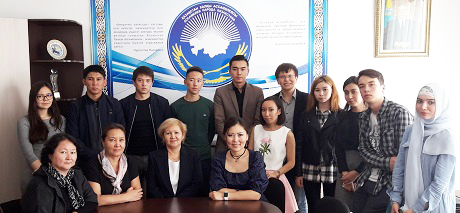On the day before the experts of the department of the Assembly of People of Kazakhstan of PSU took part in the United Republican Day in the framework of the nationwide discussion of the introduction of the Common Standard of the alphabet of the state language on the Latin script.
At the initiative of the Assembly of People of Kazakhstan, the discussion was held in the format of a round table at all the departments of the Assembly of People of Kazakhstan at the universities of the republic.
Members of scientific-expert group of the Assembly of People of Kazakhstan, historians, linguists, as well as activists of student organizations of the university took part in the discussion.
Moderator of the round table - head the department of the Assembly of People of Kazakhstan, Doctor of Historical Sciences Mamytova S.N. noted that this issue is wide from being unambiguous, receives a different interpretation in a cosmopolitan society, therefore, certainly, needs a comprehensive examination and wide discussion. At the same time, she noted that this issue of introduction of the Latin script has historical preconditions and relevance in the current conditions of the growing globalization processes. According to her, "Kazakhstan is now involved in international integration processes, becomes a major dialogue venue of the world community, attracts tourists' attention as a country of peace and harmony. And this logically requires a switch to the Latin alphabet, which is widely used in many countries of the world".
Head of the Department of History of Kazakhstan, Candidate of Historical Sciences, Professor Zuleikha Mardanova recalled that in the 20-40s the Kazakh language already used the Latin alphabet. "We do not switch to the Latin alphabet, we return to it", Zuleikha Zhenisovna considers.
At the end of the discussion, the participants expressed their support for the conducted state policy aimed at the introduction of the Common Standard of the state language alphabet on the Latin script. They confirmed that the transition to the Latin script is a truly historical issue, which opens new advantages and opportunities in the development of the state.







